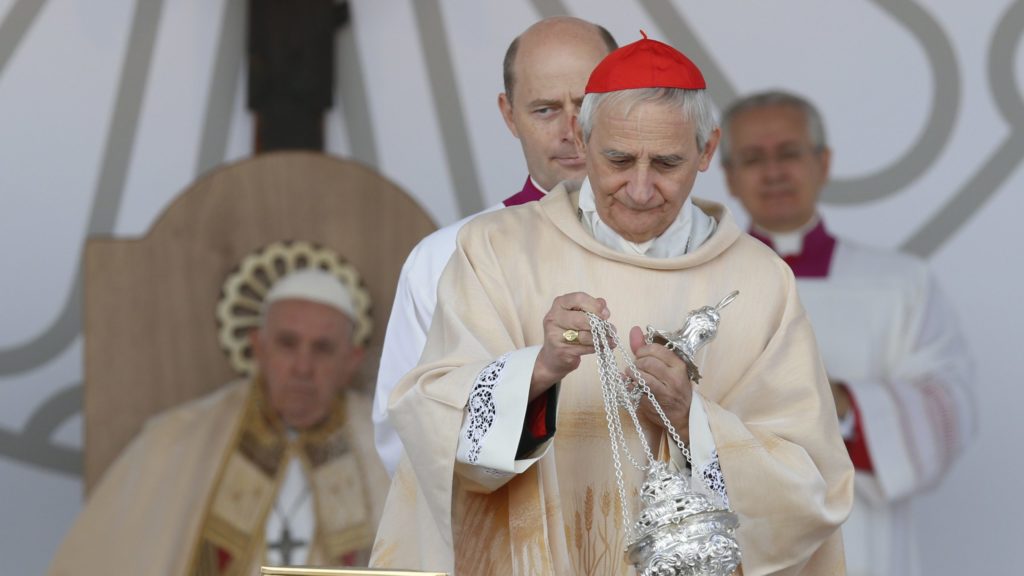In the wake of a short-lived but still unprecedented challenge to Vladimir Putin’s authority in Russia, the Vatican announced Tuesday that the pope’s personal peace envoy for the Russia-Ukraine war, Italian Cardinal Matteo Zuppi, will head to Moscow this weekend, following a similar visit to Kyiv earlier this month.
In a June 27 statement, the Vatican said Zuppi would travel to Moscow from June 28-29 alongside a representative from the Vatican’s Secretariat of State “as an envoy of Pope Francis.”
According to the statement, “the principal scope of the initiative is to encourage acts of humanity which can contribute to favoring a solution to the current tragic situation and to finding paths for reaching a just peace.”
Archbishop of Bologna and President of the Italian Bishops’ Conference, Zuppi made a two-day visit to the Ukrainian capital of Kyiv from June 5-6, where he met with Ukrainian President Volodymyr Zelenskyy and other top state and religious officials, including Major Archbishop of the Ukrainian Greek Catholic Church, Sviatoslav Shevchuk.
Pope Francis initially hinted that he was planning a peace mission to Ukraine on his return flight from Hungary earlier this year, and last month it was announced that Zuppi would serve as his official envoy.
Though he offered no specifics, he mentioned the return of Ukrainian children deported to Russia as something the Vatican could potentially help facilitate as an “act of humanity.”
Zuppi’s visit to Ukraine came nearly one month after Ukrainian President Volodymyr Zelenskyy himself met with Pope Francis at the Vatican during a whirlwind trip to Italy to foster support for Ukraine’s military defense.
At the time, Zelenskyy thanked Pope Francis for his interest but appeared to decline the Vatican’s offer of mediating negotiations, saying on a popular Italian news program that, “We do not need mediators, we need a just peace,” however, he did ask the pope to intervene in the return of Ukrainian children.
Speaking in a lengthy interview to Ukrainian news site Glavkom, Shevchuk touched on Zuppi’s recent visit to Kyiv, and reflected on what the potential talking points of a visit to Moscow could be.
For the pope to have a special envoy is no different than political leaders who appoint them, Shevchuk said in the interview, noting that while United States President Donald Trump was in office, he had named Kurt Volker as a special representative for Ukraine.
“A special representative is needed to strengthen the role of the Vatican,” he said, but noted that there have been “several communicative misunderstandings” about Zuppi’s role since the pope first hinted at the peace mission returning from Hungary.
Shevchuk noted that Pope Francis himself had spoken of Vatican mediation, but later walked that back, insisting now that they are not interested in being a “political mediator.”
Noting that he has spoken with Zuppi since he returned from Kyiv, Shevchuk said the main aim of Zuppi’s visit to Ukraine was to listen and report back what was said.
“He didn’t come with a plan to impose on anyone,” which is different that past Vatican intervention in conflicts, such as John Paul II’s intervention with US President George W Bush and Iraqi President Saddam Hussein in an attempt to stop the American invasion of Iraq in the early 2000s.
Rather than making a specific request, Zuppi, had no plan of action to propose, he said, noting that at first there was a bit of tension when Zuppi arrived, but when the Ukrainian government leadership understood that he was not there to impose anything, “the Ukrainian side breathed a sign of relief and the dialogue unfolded in a very positive way.”
“In the case of Ukraine, it was clear that the Vatican did not claim a political solution,” Shevchuk said, saying he believed Zelenskyy’s visit to the Vatican in May was “very fruitful.”
Zelenskyy, he said, “made it clear that Ukraine does not need mediators, but allies. Now the question arises: to what extent can the Vatican be an ally of Ukraine today and tomorrow? I believe this will be investigated with the help of these contacts through the special envoy.”
Shevchuk voiced support for Zelenskyy’s peace plan and said he believes there are several potential talking points for Zuppi’s visit to Moscow.
Among the biggest potential topics, he said, is the return of Ukrainian children, “which is a fundamental and painful thing.”
“I think that the possibilities for active actions on the part of the Vatican will also be considered when it comes to food security, because the issue of the grain corridor is very important for Ukraine,” Shevchuk said, saying he also personally asked Zuppi to intervene on the environmental fallout of the war, especially following the recent destruction of the dam in Kakhovskaya.
According to Shevchuk, “this is not just an ecological disaster, it is ecocide under international law. It is a type of war crime that is equated with the use of weapons of mass destruction.”
“Therefore, not only one, but three, could be the main areas in which the Vatican can act: The return of children, ecology, and food,” he said.

